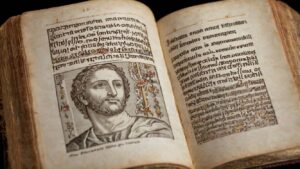603 Meaning in the Bible: Faithfulness and God’s Covenant
The number 603 in the Bible primarily appears in the Book of Numbers, specifically in the context of a census documenting 603,550 Israelite men fit for military service (Numbers 1:46). This figure signifies not only the magnitude of the Israelite community but also themes of divine order and completeness.
Conducted under divine instruction by Moses and Aaron, this census underscores the importance of structured organization and covenantal faithfulness in the biblical narrative. Exploring the symbolic weight and theological implications of such numerology within scripture opens up deeper understandings of communal identity and divine mandates.

603 Meaning in the Bible: Spiritual Symbolism and Divine Guidance
| Aspect | Meaning |
|---|---|
| Numerology Significance | 603 combines the energies of 6 (humanity, balance, and responsibility) and 3 (divine completeness and creativity). It symbolizes harmony between spiritual and earthly duties. |
| Biblical Context | Represents divine order and fulfillment, emphasizing God’s provision and the importance of stewardship in life. |
| Spiritual Insight | Encourages believers to maintain faith in God’s plan while embracing their role as stewards of His creation. It calls for responsibility with trust in divine guidance. |
| Symbolism | Reflects a balance of spiritual and material responsibilities, with an emphasis on completeness and the creative energy of God. |
| Message for Believers | A reminder to trust in divine timing, stay grounded in faith, and use personal abilities to glorify God’s work. |
Occurrences of 603 in Scripture

In examining the occurrences of the number 603 within the Bible, one finds that its significance is primarily tied to specific census records documented in the Old Covenant.
Importantly, the number appears in the Book of Numbers, where it is associated with the enumeration of the Israelites. Numbers 1:46 specifies that the census conducted by Moses and Aaron tallied 603,550 men aged twenty and above, capable of bearing arms.
This figure underscores the magnitude of the Israelite community during their wilderness journey. The precise recording of such a number emphasizes the importance of order, structure, and divine instruction within the Israelite society.
Consequently, the number 603 serves as a pivotal marker in understanding population dynamics and organizational frameworks in biblical narratives.
Historical Context of 603

Understanding the historical context of the number 603 within the Bible necessitates an examination of its association with the census of the Israelites, as recorded in the Book of Numbers.
This figure not only serves as a quantifiable measure but also carries symbolic weight, reflecting broader theological and cultural significances within the Hebrew tradition.
Analyzing these elements provides insight into the multifaceted role of numbers in biblical narratives.
Census of Israelites
The figure 603,550, as recorded in the Book of Numbers, represents the total number of able-bodied men from the twelve tribes of Israel who were counted during the census conducted in the wilderness.
This enumeration, undertaken by Moses and Aaron following divine instruction, was critical for organizational and military preparedness. The census excluded women, children, and the Levites, focusing solely on men aged twenty and above capable of bearing arms.
Contextually, this count underscores the logistical challenges and societal structures of ancient Israelite tribes. It also reflects the theological significance of obedience and covenantal faithfulness in the wilderness period.
Evaluating this census within its historical framework provides essential insights into the community’s demographic and administrative realities.
Symbolic Biblical Numbers
Rooted in the ancient Near Eastern tradition of numerology, the number 603 in the Bible often carries rich symbolic significance that extends beyond its literal enumeration.
Historically, numbers in biblical texts frequently serve to convey deeper theological or moral truths. The figure 603 appears in contexts like the census of Israelites in the Book of Numbers, symbolizing completeness and divine order.
This specific enumeration can also reflect God’s covenantal promise and the fulfillment of His divine plan. Such symbolic usage encourages readers to explore underlying spiritual messages rather than focusing solely on numerical precision.
Consequently, understanding 603 within its historical and cultural milieu enriches our comprehension of its intended significance in biblical literature.
Symbolic Meaning of Numbers

In biblical literature, numbers often carry profound symbolic significance that extends beyond their mere quantitative value. This numerological symbolism enriches the textual narrative, providing deeper layers of meaning that inform theological and moral interpretations. For instance, the number seven frequently denotes completeness or divine perfection, while forty symbolizes periods of testing or transformation. Understanding these symbolic meanings requires a nuanced appreciation of the context in which these numbers appear.
| Number | Symbolic Meaning | Contextual Example |
|---|---|---|
| 3 | Divine completeness | The Holy Trinity |
| 7 | Perfection, completion | Creation week in Genesis |
| 40 | Testing, transformation | Israelites’ 40 years in the desert |
Such symbolic interpretations are indispensable for a thorough understanding of biblical texts.
603 in the Old Testament

In the Old Scripture, the number 603 appears prominently in the context of census and numbering, particularly in the Book of Numbers where it denotes the total count of Israelite men eligible for military service.
Symbolic interpretations of this figure suggest a theological significance, reflecting themes of divine order and covenantal promises.
Additionally, the historical contexts of these enumerations offer valuable insights into the social and religious structures of ancient Israelite society.
Census and Numbering
Throughout the Old Scripture, the practice of conducting censuses and numbering the people is often depicted as a means of organizational and military preparation, as well as a reflection of divine instruction.
The Book of Numbers, for instance, details the enumeration of the Israelites by Moses at God’s command, emphasizing the need for logistical readiness and tribal assignments.
Similarly, in 2 Samuel 24, King David‘s unauthorized census underscores the theological tension between divine sovereignty and human agency, resulting in divine retribution.
These accounts underscore the multifaceted purposes of censuses, serving both practical administrative needs and theological imperatives.
Consequently, the act of numbering is intricately linked to divine mandates, shaping the narrative and identity of the Israelite community.
Symbolic Interpretations
The symbolic interpretations of numbers within the Old Scriptures reveal profound theological and cultural insights, reflecting the ancient Israelite worldview and their covenantal relationship with God. Numbers often convey deeper meanings beyond their literal sense.
For instance:
- Seven: Symbolizes completeness and divine perfection, as seen in the seven days of creation.
- Forty: Represents periods of testing or judgment, such as the forty years the Israelites wandered in the desert.
- Twelve: Denotes governmental foundation and divine authority, illustrated by the twelve tribes of Israel.
These symbolisms are not arbitrary but rooted in the Israelites’ spiritual and social frameworks, influencing their understanding of divine order and human existence.
Such numerical symbolism provides a rich layer of meaning to Biblical narratives, enhancing interpretive depth.
Historical Contexts
Examining the historical contexts within the Old Scriptures reveals how the socio-political and cultural landscapes of ancient Israel influenced the development and interpretation of biblical texts.
The Old Canon reflects the complexities of Israel’s interactions with neighboring civilizations, including Egypt, Assyria, and Babylon. These interactions shaped narratives and laws, embedding historical events like the Exodus and Exile into theological frameworks.
Social norms, such as patriarchal structures and covenantal relationships, reveal the community’s ethos and values.
Additionally, archaeological findings and extra-biblical texts provide insights into the material culture, enabling a deeper comprehension of scriptural references.
This contextual awareness is essential for understanding the intended messages and theological undertones within the Old Scriptures, illuminating their enduring relevance.
603 in the New Testament

In the New Covenant, the number 603 appears in specific genealogical contexts, emphasizing the meticulous nature of biblical record-keeping and the importance of lineage in understanding scriptural narratives. This numerical detail underscores several key aspects:
- Genealogical Significance: The number 603 is often associated with detailed ancestral records, highlighting the continuity of divine promises through generations.
- Symbolic Representation: It may symbolize completeness and the fulfillment of God’s covenants, reflecting theological depth in the New Agreement.
- Historical Accuracy: The precise use of numbers like 603 demonstrates the New Agreement authors’ commitment to historical reliability and context.
These elements collectively illustrate the intricate relationship between numerology and biblical exegesis, providing a thorough framework for deeper scriptural insights.
Theological Interpretations of 603

The number 603 in biblical texts invites various theological interpretations, particularly when considering its symbolic significance and historical application.
Scholars often examine the numerological aspects inherent within scripture, seeking to understand how such figures convey deeper spiritual truths.
Additionally, understanding the historical context in which 603 is used can provide insights into its particular relevance and function within the biblical narrative.
Symbolism in Biblical Numbers
Within the domain of biblical numerology, the number 603 carries significant theological interpretations that are deeply rooted in scriptural contexts and historical traditions. This numeral is often viewed within the framework of divine completeness and human frailty, reflecting the multifaceted nature of biblical symbolism.
Its theological interpretations can be outlined as follows:
- Census Totals: In the Book of Numbers, 603,550 is the count of Israelite men eligible for military service, signifying covenantal fulfillment and divine provision.
- Divine Order: The sum serves as a reminder of God’s structured plan for His people, emphasizing the importance of obedience and order.
- Spiritual Completeness: The number underscores a sense of spiritual wholeness and unity among the tribes of Israel.
These interpretations illustrate the rich, multi-layered symbolism inherent in biblical numerology.
Historical Context and Usage
Scholars often examine the historical context of the number 603 to understand its theological significance and application within both ancient Israelite society and broader biblical narratives.
Importantly, the number 603 appears in the Book of Numbers (1:46) as the total count of Israelite men eligible for military service. This count symbolizes not only the organizational structure of the nascent Israelite nation but also God’s promise of a prosperous and numerous people.
Theological interpretations often highlight the precision of divine provision and the meticulous care in maintaining covenantal relationships.
603 in Biblical Numerology

Biblical numerology, a field dedicated to finding spiritual significance in numbers, ascribes profound meaning to the number 603 within scriptural contexts. This number appears in various biblical passages, often signifying completeness or divine orchestration. Scholars analyze its occurrences to unearth deeper theological implications.
Key instances include:
- Census Records: In the Book of Numbers, 603,550 Israelites were counted, symbolizing God’s order and provision.
- Symbolic Representation: Numerologists interpret 603 as representing divine perfection combined with human imperfection, reflecting a holistic spiritual journey.
- Prophetic Significance: Prophetic literature often uses numbers like 603 to convey hidden messages about future events and spiritual truths.
Understanding 603 in these contexts enriches one’s grasp of biblical numerology and its integral role in theological studies. Additionally, exploring the significance of numbers like 603 can illuminate deeper connections within scripture, revealing patterns that enhance spiritual insights. For instance, scholars often reference the biblical meaning of 65, which relates to the concept of divine order and completeness. By examining these numerical associations, one gains a more comprehensive understanding of how numerology influences interpretations of religious texts.
Comparative Analysis With Other Numbers

Examining the number 603 alongside other significant biblical numbers, such as 7 and 40, reveals a nuanced tapestry of symbolic meanings that contribute to a deeper understanding of scriptural narratives.
The number 7 often represents completeness and divine perfection, as seen in the seven days of creation. Meanwhile, 40 signifies periods of testing and transformation, exemplified by the 40 days of Jesus’ temptation in the wilderness.
In contrast, 603, appearing specifically in the context of the Israelite census in Numbers 1:46, encapsulates the vastness and organizational structure of the chosen people.
Through comparative analysis, 603 can be seen as a reflection of divine providence and order, complementing the themes of completeness and transformation embodied by 7 and 40.
Modern Relevance of 603

While the historical significance of the number 603 is evident in its biblical context, its modern relevance lies in its ability to inspire reflections on community, organization, and divine oversight in contemporary spiritual practice.
Today, the number 603 can serve as a symbolic framework for understanding:
- Community Cohesion: Encouraging the notion that strength lies in unity.
- Structured Organization: Emphasizing the importance of order and systems within spiritual communities.
- Divine Supervision: Reminding believers of a higher power’s role in guiding and protecting the faithful.
Insights From Biblical Scholars

Several esteemed theologians have explored the multifaceted implications of the number 603, elucidating its deeper meanings within the broader narrative of biblical numerology.
Renowned scholars like E.W. Bullinger and F.F. Bruce have theorized that 603 signifies completeness and divine order, particularly in the context of Israelite census figures and priestly divisions. Analyzing its occurrence in Numbers 1:46, they suggest it symbolizes a collective identity of the Israelites poised for a divinely orchestrated mission.
Additionally, exegetical studies focus on its recurrence in historical contexts, linking 603 to periods of change and covenantal renewal. This scholarly discourse provides a nuanced understanding, bridging ancient texts with contemporary interpretive frameworks, thereby enriching the theological landscape.
Conclusion
In sum, the number 603, though not overtly prominent in biblical scripture, reveals a nuanced interplay of historical, symbolic, and numerological elements when examined in context.
By comparing its occurrences and significance across both Covenants, and through the lens of biblical numerology, a richer understanding emerges.
As the adage goes, ‘numbers do not lie’; consequently, the study of 603 underscores the importance of numerical analysis in theological discourse, offering profound insights into divine communication and biblical exegesis.






